Daniel M. Bensen's Blog, page 95
December 18, 2014
Agents of Re.L.I.E.F
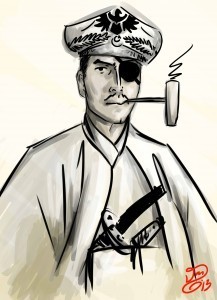
Commander Takahito MacArthur bin Saud
In a timeline where American involvement in World War Two started later and ended worse, Central and Western Europe are uninhabitable, the former Soviet Union is a long chain of warlords, the USA is catatonic, and much of the rest of the world teeters on the brink of apocalyptic collapse.
The REconstruction/Liberation/secret-Intelligence Enlisted-Force was created in the 1950’s to help save civilization in the Old World. They argue that they have succeeded.
Governments within the Re.L.I.E.F zone do not go to war with each other, and they have indeed rebuilt an industrial base. At least, they can service and refuel Re.L.I.E.F ‘s fleet of aircraft. Re.L.I.E.F subject states have a growing economy, funneled mostly into the fleet, itself. And they have an education system…with the soul purpose of identifying talent to send to the airborne university established by rescued Nazi aeronautical engineers, die Luftfahrttechnik, Mathematik und Intelligenz Akademie, aka the L.M.I.A. (pronounced “lamia,” of course).
Now, after nearly 50 years of ultra-isolationism, the United States of America has again taken a military interest in the affairs of the Old World. And they are appalled at what they see. American media is abuzz with denunciations of Re.L.I.E.F, calling it an international dictatorship, a terrorist organization funded by piracy, its once-noble mission hijacked by the L.M.I.A.
Commander Takahito MacArthur bin Saud, Shogun of Japan, King of Arabia, Protector of the Peoples, has made known his displeasure with the USA by blockading Alaska and sinking any American ship that dares sail west of Hawaii. The few passenger planes that had begun flying across the Atlantic are grounded once more, and American oceangoing vessels must travel under armed escort even within sight of American shores. Nuclear tests on Iceland and the Aleutians are the subject of much consternation in Washington.
And there are darker rumors. Turning Machines networked into an electronic brain the size of a continent. Genetic modification of bacteria and viruses. Intercontinental Ballistic Missiles. Hydrogen fusion.
War is again coming to the world, perhaps for the final time.
~~~
Okay, so I was watching this S.H.I.E.L.D thing and a lot of questions came up:
1) Who do these people report to? The US government? If so, why do they train and employ foreigners?
2) Where does their money come from? Taxes? Come on.
3) Why is their inter-departmental communication so consistently awful? I mean, okay, being host to two generations of secret Nazi octopus-cultists is pretty bad, but I watched an episode where Agent Triplett and Agent Ward just straight-up started brawling when their orders weren’t clear. And then there was this secret medical base that those same two agents (and their friends) blew the hell up, killing the two guards that their own organization had stationed there? That’s some bad operations management, people.
So, I got to thinking: how would you get an international military/intelligence ring with a private fleet of  aircraft, proprietary technology, training facilities, and funding for it all? How could it get to the point where you have agents wrasslin’ in super-tech planes for no reason?
Perhaps if the Marshall Plan, SCAP, and NATO got fed into a blender, lost support from the US government, and went rogue in an anarchic world? Sound like a plan?
~~~
Welp, that’s it for 2014. Merry Christmas and Happy New Year, everyone. Tune back in on January 13th, when the Kingdoms of Evil will be back with new podcasts, new awful ideas, and maybe some good news.
December 16, 2014
Ottoman-period Bulgarian terminology is Great!
…or what I did on my vacation.
Last weekend I spent three lovely nights with my wife in Koprivshtitsa, an architectural preserve in central Bulgaria. Koprivshtitsa was a town of wool-merchants (and the center of the April Uprising, which is why it has special status) and preserves many of the features of a mercantile town in Ottoman Bulgaria.
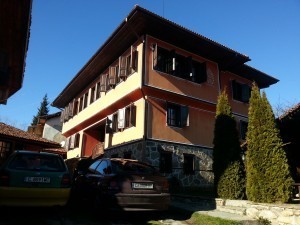
Our hotel
Since I’m writing a book about Ottoman Bulgaria, I took a lot of notes and pictures:
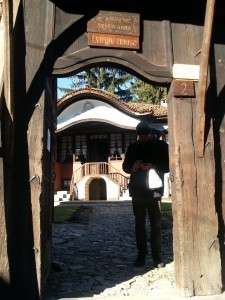
The Lyubov House, my basis for Elena’s adopted father’s house
Some vocabulary
Odaya=sitting room (modern Bulgarian: priemna staya, or “first room”)
Komsholuk=a wicket gate in your garden wall so you can visit your neighbor without going onto the street. From Turkish “komÅu” or neighbor.
Mangal=a warming stove, in modern Bulgarian, an extremely rude word for a Roma person.
Beglikchiya=a tax collector (I think) from “beglik,” taxes paid to the Ottomans.
Djelepin = a drover of animals

Pafti belt-buckles and bracelets
Nakit=a piece of jewelry
Pafti=women’s paired belt buckles (always plural)

Elena’s costume is on the left with the dark green sukman.
Sukman=woman’s costume, sleevless woolen top with long skirts worn over linen undershirt with silk sleeves.
Vkashti=kitchen, for cooking and eating, not baking. Sit on the floor around low table
Noshtva= dough-kneeding trough
Mazhka gostna=men’s guest-room to the right of the audience room (southern exposure). Includes benches and cushions, small table, samovar, fireplace in bedroom extends through northern wall into guest room, with ceramic warming stove.
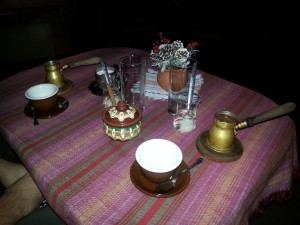
Coffee service with djzhezve, cups, and spoonfulls of byalo sladko in water
Dzhezve=a Turkish coffee-pot (from Turkish cezve)
Byalo sladko=(“white jam”) a treacle-like paste made from sugar-syrup and cream of tartar
Konak=Ottoman administrative building, mansion.
Chartak=balcony opening off the audience chamber, connecting men and women’s guest rooms on the outside.
Soba=birthing room or living room: first on the left when you enter the first floor (southern exposure, below men’s guest-room).
Yashure=a dish of boiled wheat-berries and sugar (in our family, we just call it “zhito” or grain)
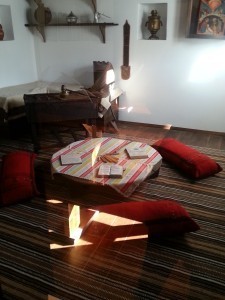
A monastery school
Kilino uchilishte=a monastery school, the first form of public education in Bulgaria
Some slices of life:
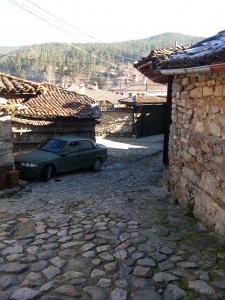
The cobbled streets of Koprivshtitsa…
Small wooden table with smooth surface and googly underparts, good for magic.
Go through first story of a house through double staircase on the far end of a foyer to ascend to audience room.
Or go into sunken first story and take servant’s stair up to kitchen.
Foyer ceiling is carved, perhaps with chandelier.
Elliptical dome of audience room with frescos showing where merchant trades and in what commodity. With chandelier.
No chairs, but cushions around low tables and padded benches around audience chamber windows (southern exposure)
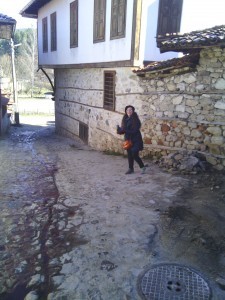
…run red with pig blood.
Wooden floors covered with rugs.
Felted wall hangings in brown red and cream.
Chainmail cuffs
U-shaped pewter bracelet
Lytova kashta is Kostadin’s home. He works in a distillery attached to the konak.
Servants quarters are built into garden wall. Where Elena lives.
Where Elena studies: Low table with cushion to kneel on. Warming stove. Kneel on floors put elbows on writing desk.
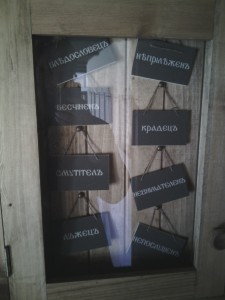
Labels hung on bad students: “Writer of pale words, un-diligent, disorderly, thief, disturber, careless, liar, disobedient.”
Decorative big nails in the door
Floppy hats for bandits
Coffee mixed with ground roasted chickpeas

Text on a gravestone of a merchant: “I am not what you see today. What I am, you will soon become…”
Some names:

Ottoman-era Bulgarian names

More names: Note how grandchildren are named after grandparents

A potential place for a bandits’ hideout. Pines and rocky outcroppings with water running down the middle.
December 14, 2014
86 International Fiction with Elías Combarro and Leticia Lara
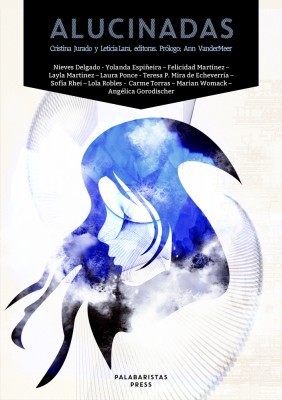
ALUCINADAS
http://www.thekingdomsofevil.com/wp-content/uploads/2014/12/86Elias.mp3
Last week I talked with Elías Combarro of Sense of Wonder and Leticia Lara of Fantástica – Ficción about Spanish sci-fi and Fantasy. This week, I’m talking with them about the international movement in science fiction and fantasy.
Mañana todavía (Still Tomorrow) edited by Ricard Ruiz Garzón
Maybe not the end of the world, but the end of the world as we know it.
The Alucinadas Anthology: of Spanish SF stories written by women (available now!)
Clarkesworld’s Chinese translation Kickstarter campaign (it made nearly twice its goal)
The Map of Time and The Map of the Sky by Félix J. Palma
Rosa Montero’s Tears in the Rain, an homage to Blade-Runner
Kalpa Imperial by Angelica Gorodischer and translated by Ursula K. LeGuin
The Terra Nova Anthology: an anthology of contemporary Science Fiction
Readers from English speaking countries are not used to reading translations
Haikasoru, a translator of Japanese Science Fiction
Lavie Tidhar’s Apex Book of World SF
If those new worlds are only invented by English speakers, they become stale.
The fact that so many people speak the same language means they can share stories with each other.
A project I’ve worked on 
It’s not the formula we’re used to
Vita Nostra versus Lexicon
Sometimes you read a book by a Spanish author, and the characters are named Michael or Lisa and the action takes place in New York.
There are Spanish authors who use sentences that make more sense in English than in Spanish.
Rafael Marin, Spanish translator of Orson Scott Card and Brandon Sanderson
The Map of the Sky by Félix J. Palma
Su Cara Frente A Mí by Luis Angel Cofiño similar to Terminal Cafe by Ian McDonald (it’s not the same treatment, but the idea is similar)
The Terra Nova Anthology: (shameless self promotion!)
Between the Lines by José Antonio Cotrina.
Akasa-Puspa by Juan Miguel Aguilera and Javier Redal similar to Dune by Frank Herbert
86 International Fiction with ElÃas Combarro and Leticia Lara

ALUCINADAS
http://www.thekingdomsofevil.com/wp-content/uploads/2014/12/86Elias.mp3
Last week I talked with ElÃas Combarro of Sense of Wonder and Leticia Lara of Fantástica â Ficción about Spanish sci-fi and Fantasy. This week, I’m talking with them about the international movement in science fiction and fantasy.
Mañana todavÃa (Still Tomorrow) edited by Ricard Ruiz Garzón
Maybe not the end of the world, but the end of the world as we know it.
The Alucinadas Anthology: of Spanish SF stories written by women (available now!)
Clarkesworld’s Chinese translation Kickstarter campaign (it made nearly twice its goal)
The Map of Time and The Map of the Sky by Félix J. Palma
Rosa Montero’s Tears in the Rain, an homage to Blade-Runner
Kalpa Imperial  by Angelica Gorodischer and translated by Ursula K. LeGuin
The Terra Nova Anthology: an anthology of contemporary Science Fiction
Readers from English speaking countries are not used to reading translations
Haikasoru, a translator of Japanese Science Fiction
Lavie Tidhar’s  Apex Book of World SF
If those new worlds are only invented by English speakers, they become stale.
The fact that so many people speak the same language means they can share stories with each other.
A project I’ve worked on 
It’s not the formula we’re used to
Vita Nostra versus Lexicon Â
Sometimes you read a book by a Spanish author, and the characters are named Michael or Lisa and the action takes place in New York.
There are Spanish authors who use sentences that make more sense in English than in Spanish.
Rafael Marin, Spanish translator of Orson Scott Card and Brandon Sanderson
The Map of the Sky by Félix J. Palma
Su Cara Frente A Mà by Luis Angel Cofiño similar to Terminal Cafe by Ian McDonald (it’s not the same treatment, but the idea is similar)
The Terra Nova Anthology: (shameless self promotion!)
Between the Lines by José Antonio Cotrina.
Akasa-Puspa by Juan Miguel Aguilera and Javier Redal similar to Dune by Frank Herbert
December 11, 2014
The New Age
We discovered Forced Metempsychosis in the 1950s, and used psychonauts and, later, the astral projections of digital computers to mine the Astral Plane for its precious resources. The natives, however, grew restless.
The New Age, a comic by Daniel M. Bensen and Turbofanatic. Coming soon!
~~~
Imagine if you will a Point of historical Divergence in the late 19th century. Turns out C.W. Leadbeater was right all along. European society, having solidified its hold on its colonial possessions and rapidly industrializing, stumbles upon an entirely new world, separate from, yet interpenetrating our physical reality.
Welcome to the Astral Plane, home to the turbulent elementals, the spirits of the departed, and the mysterious, godlike Devas. Mastering the new science of Practical Occultism, Euro-American explorers and exploiters stand to gain gain enormous power and wealth. A New Age is dawning!
Except we’re not the only colonizers. Other human societies have already established Lodges in the Astral Realms, some old and powerful:
1) Tibetan Brotherhood, who seek to uplift all humanity into Practitioners and pursue this goal with missionary zeal.
2) Tribal lodges in India and Africa who follow orders from the Devas. Sometimes friendly.
3) Puppet societies under the control of anti-human Devas, planning the invasion the Physical Realm.
4) A Native American secret society with continuity to Atlantis, who use occultism as a science.
5) Not to mention all the “other humanities” from the rest of the Solar System!
Tally ho!
December 9, 2014
Bulgarian Affinity Terminology is Great!
Last week, we talked about blood relatives. Now itâs time to talk about something a little more complicated, the in-laws.
In English, all of these people are named some version of X-in-law, but in Bulgarian, they almost all have unique names. And those names change depending on whether they are your in-laws or your spouseâs.
Before I continue I should point out that everyone I talked to said things like âoh, right, shurei. What was that again?â Most of these words are on the way out in modern Bulgaria, although I canât see anything replacing them (aside from phrases like brat na zhena mi, the brother of my wife). Also, I have the impression that these words are different in different Bulgarian dialects. The following terms come from my wife, her grandmother, some random Sofiantsi, and Google Translate, so you should consider them to be the Sofiiski dialect, or standard Bulgarian (although itâs possible some Shopski dialect snuck in there). If you know of other words or think Iâve made a mistake, please tell me.
Mazh=Husband (literally ‘man’)
Svekar=Father of the husband (i.e. a woman’s father-in-law)
Svekarva=Mother of the husband
Dever=Brother of the husband
Etarva=His wife (a woman’s …wife-in-law?)
Zalva=Sister of the husband
Zet=Her husband
If you’re a man, of course, the whole thing changes…
Zhena=Wife (literally ‘woman’)
Tast=Father of the wife
Tashta=Mother of the wife
Shurei=Brother of the wife
Shurenaika=His wife
Baldaza=Sister of the wife
Badzhanak=Her husband
And if you have kids…
Sin=Son
Snakha=His wife (your daughter-in-law)
Dazhterya=Daughter
Zet=Her husband (your son-in-law)
Svat=Father of your child’s spouse
Svatya=Mother of your child’s spouse
Some of these words have clear cognates in Slavic and other Indo-European languages (like dazhterya), but others come from Turkish (bacanak, baldız, zenne). I can’t say for certain, though, whether those Turkish words added new relationships , or replaced Bulgarian words that already existed for those relationships.
But in any case if you’re a man in a hetero-normative West-Bulgarian village, your wife has two parents, your tast and tashta. Traditionally, young couples moved into the sonâs familyâs house, or built a new house for the son on his familyâs land, so tast i tashta were visitors and not hosts of their daughter and her husband (their zet, that is, you, boy). Hence the saying, tashta kashta obrashta, “the mother of the bride turns the house upside-down.” Nowadays, though, itâs just as common for the groom to move in with his wifeâs family, and, like me, enjoy a lifetime in an upside-down house.
December 7, 2014
85 Spanish SFF with ElÃas Combarro and Leticia Lara
http://www.thekingdomsofevil.com/wp-content/uploads/2014/12/85EliasDec.mp3
This week I’m talking with ElÃas Combarro of Sense of Wonder and Leticia Lara of Fantástica â Ficción about Spanish-language science fiction and fantasy.
Los VerdHugos: the sci-fi and fantasy podcast of Elias and Leticia along with Miquel Codony, Josep Maria Oriol, and Pedro Roman.
The Terra Nova Anthology: an anthology of contemporary Science Fiction
The Alucinadas Anthology: of Spanish SF stories written by women (available now!)
The Domingo Santos Award
Eurocon in Barcelona in 2016!
That’s a good problem to have: too many fans
Isaac Azimov, Arthur C. Clarke, and Ursula K. Le Guin vrs. George R.R. Martin, Patrick Rothfus, and Brandon Sanderson
Cyberdark (not “Feverdark” as I mispronounced it)
We don’t know why other people like fantasy more
Andrzej Sapkowski The guy who wrote The WitcherÂ
Rodolfo Martinez Author of The Queen’s AdeptÂ
Juan Miguel Aguilera Hard SF, Space Opera, and Historical Fantasy
Javier Negrete and Elia Barceló
And the new wave: Emilio Bueso and  Francisco Jota-Pérez
Presencia Humana a magazine of the New Weird
China Miéville and The City and the City
85 Spanish SFF with Elías Combarro and Leticia Lara
http://www.thekingdomsofevil.com/wp-content/uploads/2014/12/85EliasDec.mp3
This week I’m talking with Elías Combarro of Sense of Wonder and Leticia Lara of Fantástica – Ficción about Spanish-language science fiction and fantasy.
Los VerdHugos: the sci-fi and fantasy podcast of Elias and Leticia along with Miquel Codony, Josep Maria Oriol, and Pedro Roman.
The Terra Nova Anthology: an anthology of contemporary Science Fiction
The Alucinadas Anthology: of Spanish SF stories written by women (available now!)
The Domingo Santos Award
Eurocon in Barcelona in 2016!
That’s a good problem to have: too many fans
Isaac Azimov, Arthur C. Clarke, and Ursula K. Le Guin vrs. George R.R. Martin, Patrick Rothfus, and Brandon Sanderson
Cyberdark (not “Feverdark” as I mispronounced it)
We don’t know why other people like fantasy more
Andrzej Sapkowski The guy who wrote The Witcher
Rodolfo Martinez Author of The Queen’s Adept
Juan Miguel Aguilera Hard SF, Space Opera, and Historical Fantasy
Javier Negrete and Elia Barceló
And the new wave: Emilio Bueso and Francisco Jota-Pérez
Presencia Humana a magazine of the New Weird
China Miéville and The City and the City
December 4, 2014
Beware the Wolf
What’s this? Oh, nothing, just a quote I found while skimming The Astral Plane, its Scenery, Inhabitants, and Phenomena
“…there are certain circumstances under which the body may be seized upon by other astral entities and materialized, not into the human form, but into that of some wild animal—usually the wolf; and in that condition it will range the surrounding country killing other animals, and even human beings, thus satisfying not only its own craving for blood, but that of the fiends who drive it on.”
In other words you have a werewolf or skin-walker, who sits in their house meditating while using animals to terrorize the nearby population. When the Astral Plane invades, werewolves will be their fifth-column.
December 2, 2014
Bulgarian Kinship Terms are Great!
In this season of family drama, you might be wishing for a simpler system kinship terms. Why not call all older people one thing and all younger people something else, for example, like in Piraha? Wouldn’t that be nice?
Well, if a simple kinship system is what you want, you’ve come to the wrong place. When it comes to kinship, Bulgarian is to English as English is to Priaha.
Let’s get started with your generation.
Brat=a brother in the abstract sense (as in all men are brothers)
Bratche=a younger brother
Batko=an older brother (or any older boy)
Sestra=a sister in the abstract sense
Sestrichka=a younger sister
Kaka=an older sister (or any older girl)
Bratovchet=a male cousin
Bratovchetka=a female cousin
Clearly, there’s something going on with suffixes here. You can probably recognize that -che diminutive and the -ka feminine. There’s also the -ov genitive suffix, a fossil from when Bulgarian had case. So “brat-ov-chet-ka” breaks down as “brother-‘s-little-girl.”
Good so far? Okay, on to your parents’ generation.
Bashta=Father
Maika=Mother
Chicho=Father’s brother (or any older man)
Vuicho=Mother’s brother
Lelya=Father’s sister (or any older woman)
Tetka=Mother’s sister
When those people get married, their spouses take masculine or feminine version of their title.
Strina=Chicho’s wife (uh, aside from this one)
Vuina=Vuicho’s wife
Lelincho=Lelya’s husband
Tetincho=Tetka’s husband
And finally at the top of the family (literally in my wife’s case; her grandparents live in the apartment above us):
Dyado=Grandpa (or any old man)
Baba=Grandma (or any old woman)
Bulgarian has no special words great-aunts and -uncles (all of them are dyado or baba), or for third cousins or cousins twice removed and so forth.
But of course that isn’t what you call any of these people.
Unlike other Slavic languages, Bulgarian has no system of cases…or not in everyday speech, anyway. For kinship terms, the old vocative case has stuck around.
The vocative case is completely gone in English, but basically it’s the form of a noun (or a person’s name) you use when talking to the person. So for example Julius Caesar’s friend is Brutus, but Caesar says “Et tu Brute?” when talking to his friend. For the same reason, my daughter talks about her mama (mommy), but when speaking to her, calls her mamo (oh, mommy!).
And then it gets complicated. In Bulgarian, older people tend to take the term a younger person applies to them, add a diminutive, and apply it to that younger person. This may be a relic of the genitive case (equivalent to ‘s in English); my wife calls our daughter mamena slada (the sweet thing of the mommy). Chop off the ending, and you get what mame, which is what she (the mothers) calls her (the daughter).
name
you call them
they call you
Mother
Maika, Mama
Maiko, Mamo
Mame, Mami, Mamentse
Father
Bashta, Tatko
Tatko
Tate, Tati, Tatentse
Older brother
Batko
Bate
Bate, Batentse
Older sister
Kaka
Kake
Kake, Kakentse
Grandpa
Baba
Babo
Babe, Babi, Babentse
Grandma
Dyado
Dyado
Dyado, dedi
I’ve heard that Persian and Egyptian Arabic also do this thing where mother’s call their babies some derivative of “mother.” Is this an Ottoman Empire thing? Do Turkish and Greek do it? And how about some other kinship terms English lacks? What’s kinship like in your language?
And tune in next Wednesday for Bulgarian in-law vocabulary.


![Rodninski-nazvania[1]](https://i.gr-assets.com/images/S/compressed.photo.goodreads.com/hostedimages/1418234200i/12718150.jpg)



